China-Africa trade reached an all-time high in 2021
Hi Quartz Africa readers!
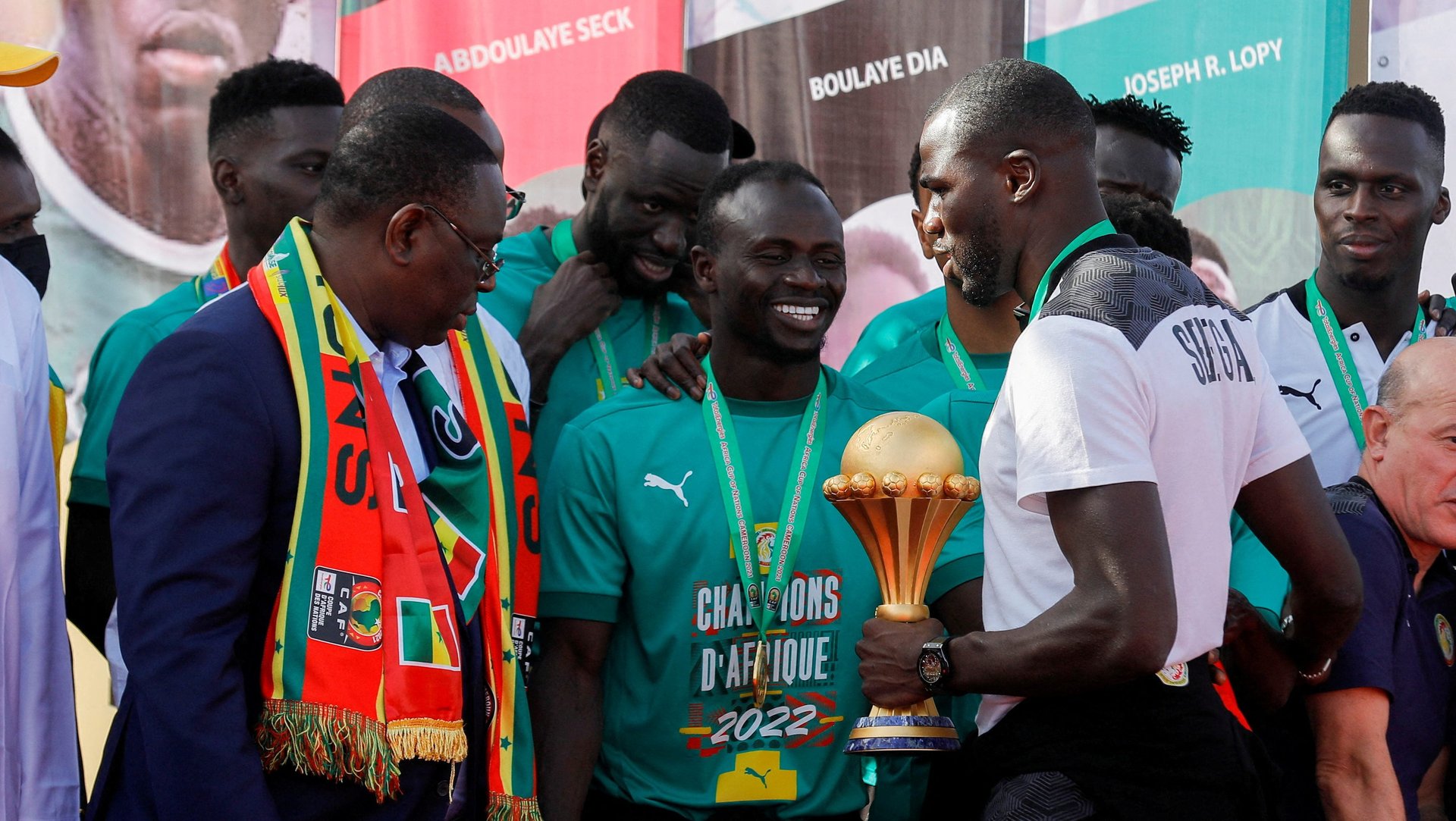

Hi Quartz Africa readers!
We’re proud to announce that in a few days, we’ll be launching our first Africa-specific subscription product, which we’re thinking of as a front-row seat to innovation on the continent.
Quartz Africa membership will include unlimited access to Quartz Africa’s journalism, plus an exclusive weekly email that goes deep into the startups, innovators, and sectors driving Africa’s technological boom. Each week, we’ll also share a case study of a company making an impact.
As readers of Quartz Africa Weekly—which will remain free!—you’ll receive free access to our subscription newsletter for the first four weeks. If you want to let others in on that gift, make sure they’re subscribed to this email.
Okay, let’s get started.
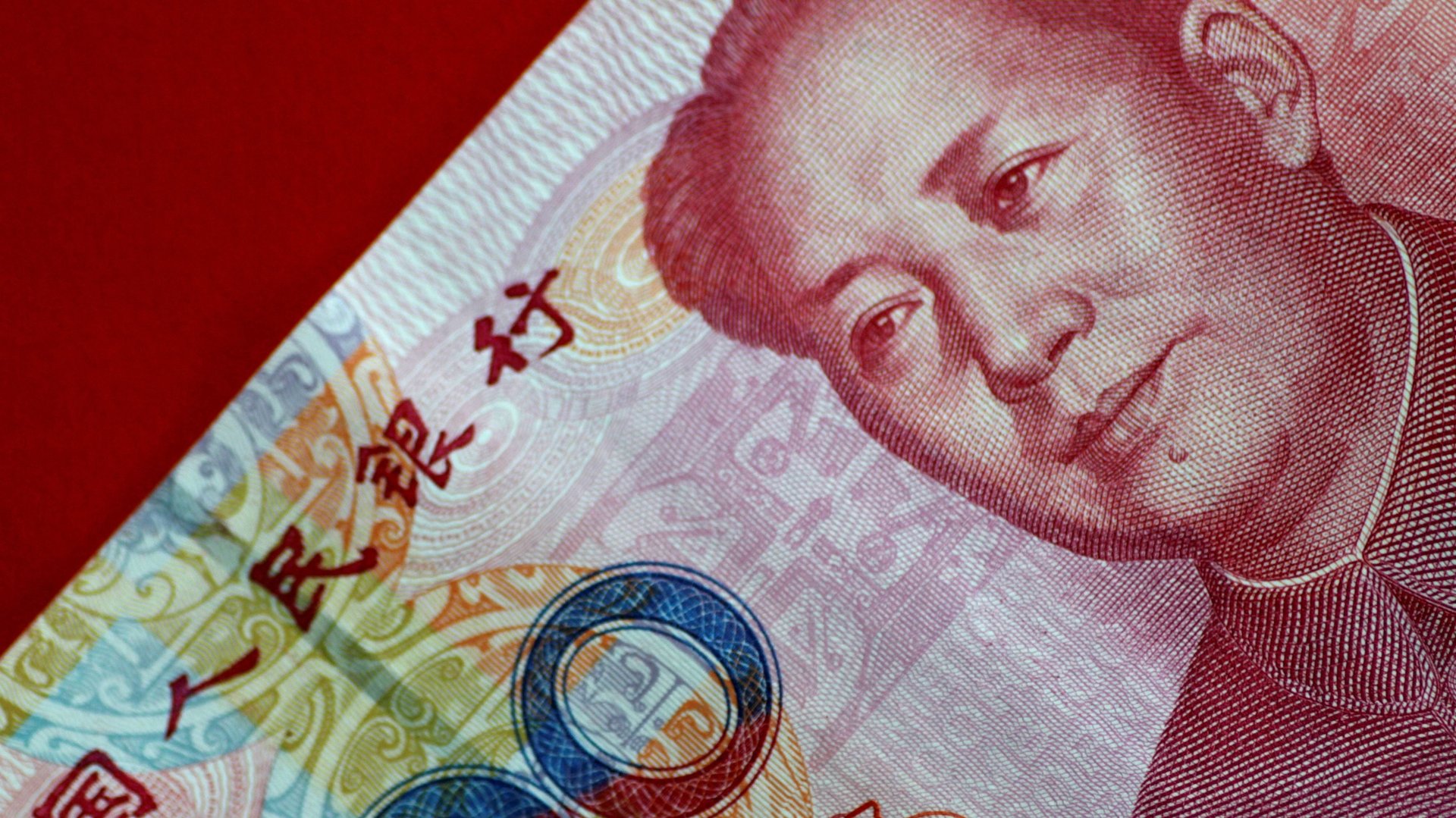
Trade between Africa and China rose to a record high last year, according to recently released data by China’s customs agency. China is Africa’s largest trading partner.
The value of trade between them rose by 35% from 2020 to $254 billion last year, mainly due to an increase in Chinese exports of pandemic goods, says Zainab Usman, senior fellow and director of the Africa Program at the Carnegie Endowment for International Peace in Washington, DC.
“The pandemic might have disrupted trade and economic activity globally, but it did not really dampen demand for essential goods during the pandemic such as pharmaceuticals,” she tells Quartz.
Despite the increase in trade, China’s exports to China continue to exceed Africa’s exports to the Asian country.
Many African countries are working to reduce this deficit. Rwanda and Ethiopia, for example, are using creative marketing approaches to attract e-commerce users in China. China wants to import more goods from Africa, especially agricultural products, for which Kenya is creating a platform.
But Africa remains one of China’s smallest trading partners, with trade between the two making up about 4% of China’s overall global trade. There are vast opportunities for the continent to not only reduce the trade deficit, but greatly increase its exports to China.—Carlos Mureithi, east Africa correspondent.
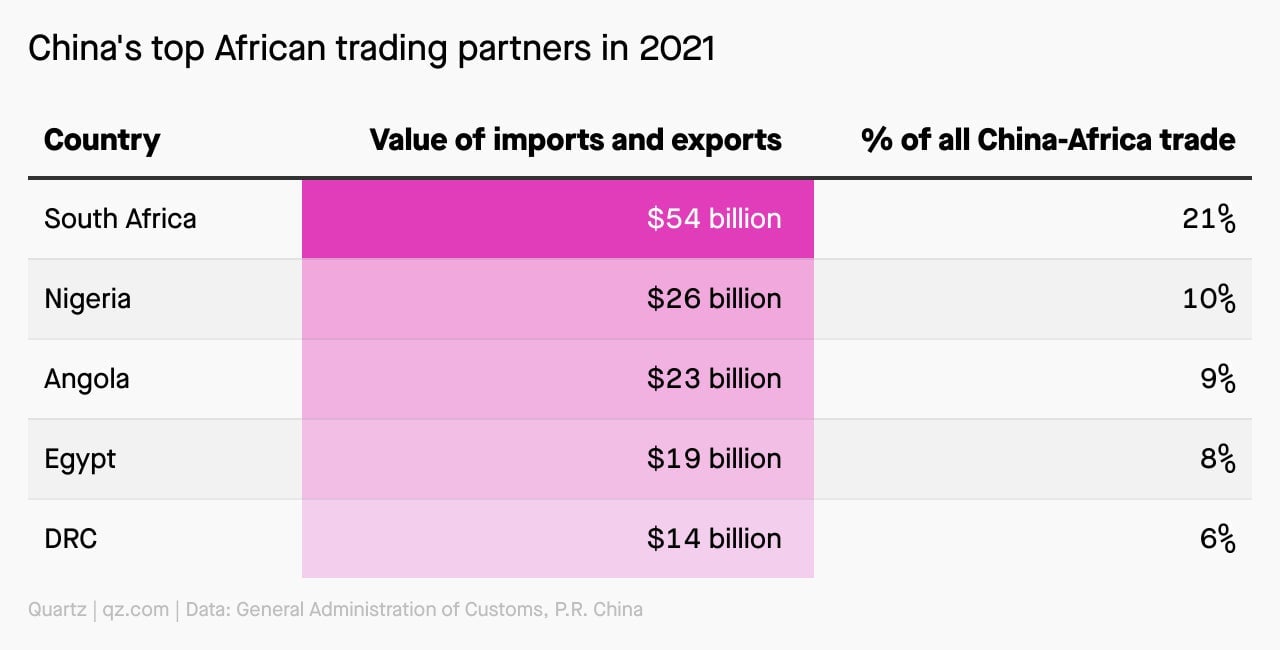
Stories this week
The battle for mobile money dominance in Ethiopia. Safaricom—Kenya’s largest mobile operator—recently opened up an Addis office, becoming the first foreign telco to operate in Africa’s second most populous country. Tom Collins reports on how the greatest opportunity for Safaricom and the government-owned Ethio Telecom lies in conquering the mobile money space.
Vodacom was ordered to pay a South African inventor millions. A court ordered Africa’s second largest mobile operator to make a huge payout to Nkosana Makate. The $3 million offered by Vodacom was deemed paltry by the courts, when compared to Makate’s $1.2 billion demand.
Can Nigeria’s crypto ban be resolved? Alexander Onukwue speaks with the Nigeria country manager of a cryptocurrency exchange company to explore what needs to happen for the year-old ban on crypto to end.
The US dollar reigns supreme in Zimbabwe. As Zimbabwe’s economy struggles, the demand for US dollars keeps soaring. Farai Shawn Matiashe reports on why Zimbabweans are sleeping outside banks and lining up for hours at bureaus de change to get US dollars.
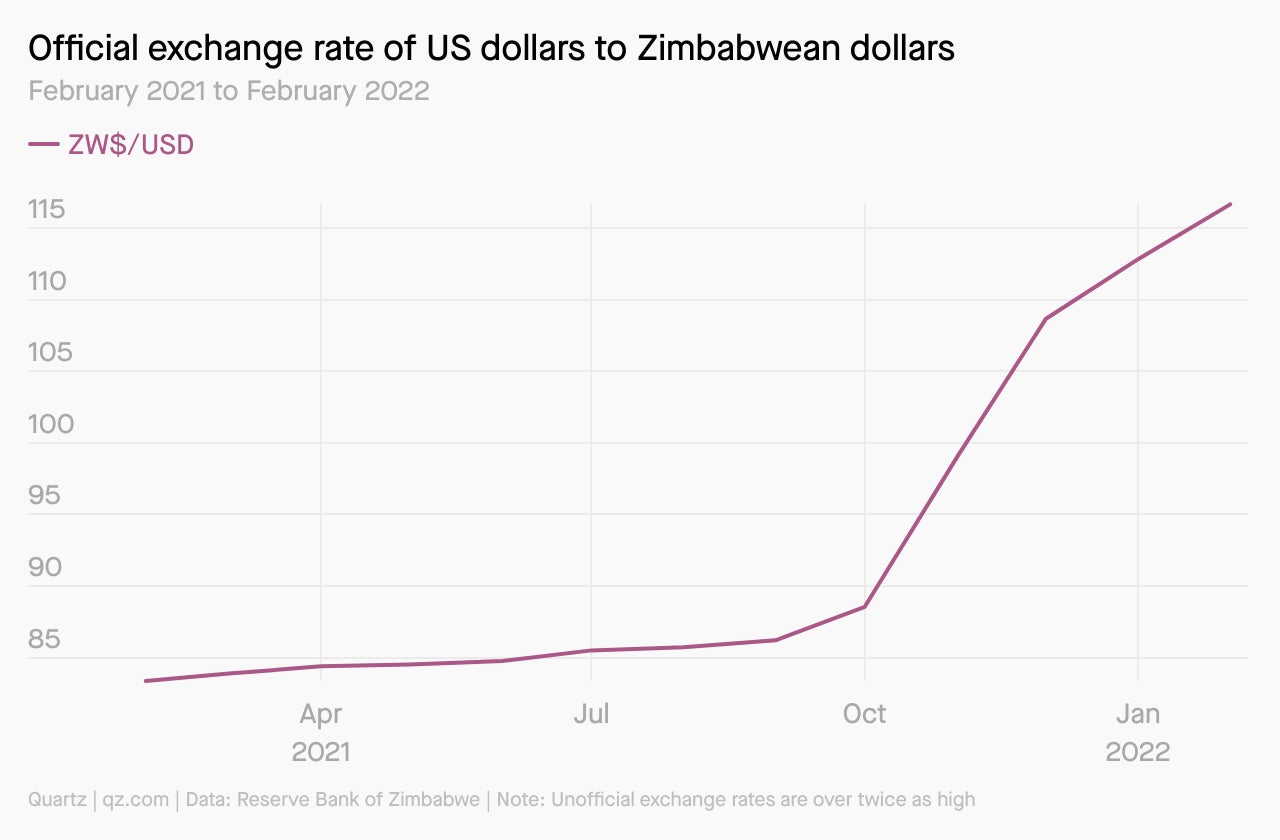
The inequality of climate change. For the second time in two weeks, Madagascar was hit by a cyclone. In the wake of death and destruction in the region, Annalisa Merelli reports on the dilemma of poor countries that are hardest hit by climate change.
Senegal rewards its soccer heroes. After winning the Africa Cup of Nations, Senegal’s soccer team received a grand welcome at home. A pledge of cash and land titles from the country’s president was icing on the cake, Alexander Onukwue reports.
Afcon and the challenges of intra-Africa travel. Focusing on the experiences of Nigerian journalists who went to Cameroon to cover the Africa Cup of Nations, Tolu Olasoji reports on visas and other logistical challenges that are a burden for Africans traveling in Africa.
Charting the growth of venture capital investment in Africa
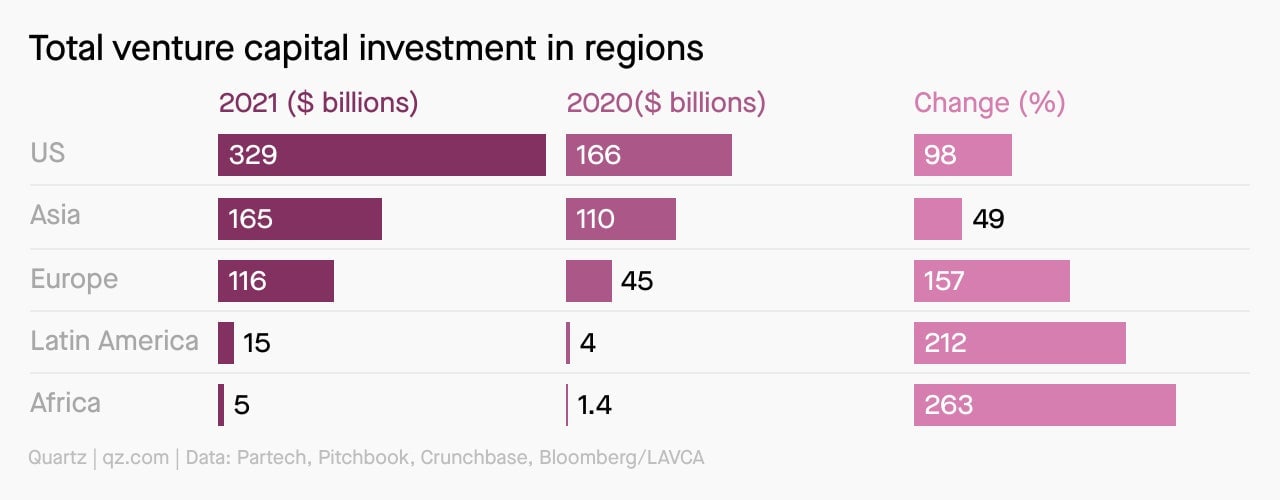
Africa is the fastest growing region for venture capital investment. More than 600 tech companies with the majority of their operations and users in Africa raised $5.2 billion from venture capitalists in 2021, according to a report from Partech, a VC firm that tracks annual data.
The record sum is three times that of 2020 and was partly driven by renewed interest in growth-stage funding for startups like Flutterwave, Yoco, Wave, and Andela. Venture capital investment into companies grew in every region in 2021, but the figures from Africa and Latin America are particularly interesting, Alexander Onukwue reports.
Dealmaker
Reliance Health, a Nigerian health insurance company, raised $40 million in a Series B round led by General Atlantic, an American firm making its first investment in Africa. Other investors in the round were Partech, Picus Capital, Tencent Exploration, Asia Africa Investment and Consulting, P1 Ventures, Laerdal Million Lives Fund, and M3.
Thndr, an Egypt-based retail stock trading app, raised $20 million in a Series A round jointly led by Tiger Global, BECO Capital, and Prosus Ventures. For Tiger Global, it is the second investment this year in an Africa-based Robinhood-like company, following its investment in Nigerian startup Bamboo. Thndr wants to serve the Middle East and North Africa region.
Mecho Autotech, a Nigerian on-demand vehicle repair and maintenance service, raised $2.15 million in seed money to expand its business capacity. The company has its own mechanics but also aggregates from elsewhere, in a bid to make car repair a click away. Investors in the round include Future Africa, HoaQ Capital, Cathexis Ventures, V8 Capital, Silver Squid, and Tekedia Capital.
Quotable
“They think it’s a brothel you are running.”
A Kenyan woman who started an AirBnb side hustle was accused of running a brothel. Based on the experiences of female gig workers in Kenya, Uganda, Nigeria, and Ghana, Grace Natabaalo reports on how they are battling beliefs about what real work is.
Quartz Gems

Innovation isn’t always welcome. When the first baby was born from a frozen egg in 1996, the technology was so new and untrusted that the mother refused to reveal her name. More than 25 years later, egg freezing is much more widely accepted, and even approaching the mainstream—now the question is how well it works, and who’s missing out on access. Learn more about the history and future of freezing eggs in this week’s episode of the Quartz Obsession podcast.
Listen on: Apple Podcasts | Spotify | Google | Stitcher
One big number
$23 billion
Between 2007 and 2020, China’s two main overseas development banks invested $23 billion in infrastructure projects in Africa, according to a Feb. 9 analysis by the Center for Global Development, a US think tank. That’s $8 billion more than the contributions of the top eight lenders combined, including the World Bank, African Development Bank, and US and European development banks. Tim McDonnell dives deep into the numbers of China’s infrastructure investments in Africa.
Other things we liked
A deep dive into history. For National Geographic, African-American diver, storyteller, and explorer Tara Roberts writes about her work helping to document some of the thousand slave ships that are wrecked in the Atlantic Ocean.
From Togo to Greenland. For the Observer, Michael Segalov writes about a man who left Togo in 1965 for a new life in Greenland. At the age of 80, Teté-Michel Kpomassie is now looking to retire to his “spiritual home.”
Senegal’s party may not last long. In an Al-Jazeera opinion piece, Amat Jeng explains that Senegalese people will soon refocus on “democratic backsliding, gradual shrinking of civil liberties, and systemic corruption” that cannot be swept away by their soccer team’s historic victory in Cameroon.
What Sudan’s democracy resistance wants. For the New York Times, Abdi Latif Dahir writes about the grass-roots organizers banding together to keep the hope of democracy alive in Sudan.
ICYMI
Players in Africa’s tech sector meet. The Africa Tech Summit will take place in Nairobi, connecting industry leaders from all over the world. (Feb. 24 and 25)
A focus on cloud computing and data centers. The ITWeb Cloud & Data Centre Summit 2022 in Johannesburg will focus on topics including hyperscale data centers, cloud security and compliance, and data center modernization. (Feb. 24)
🎵 This brief was produced while listening to “Beggie Beggie” by Ayra Starr feat. CKay (Nigeria)
Our best wishes for a productive and ideas-filled week ahead. Please send any news, comments, suggestions, ideas, bitcoin, and Afcon winnings to [email protected]. You can follow us on Twitter at @qzafrica for updates throughout the day.
If you received this email from a friend or colleague, you can sign up here to receive the Quartz Africa Weekly Brief in your inbox every week. You can also follow Quartz Africa on Facebook.